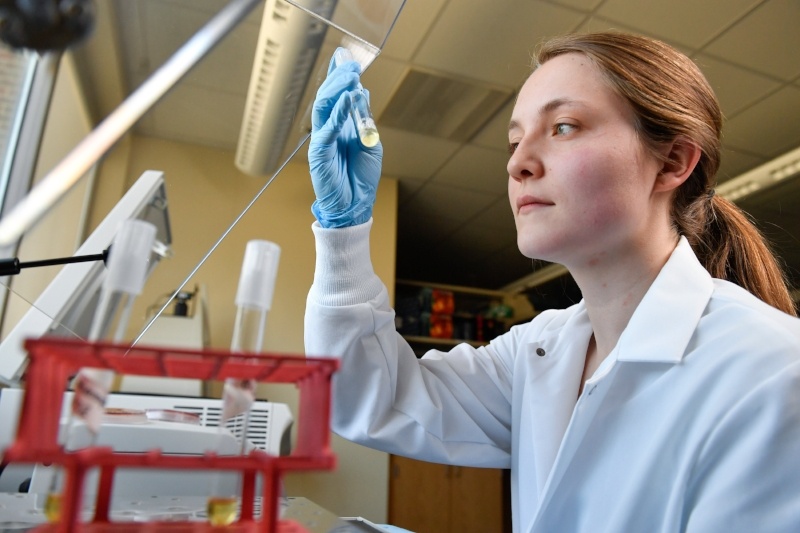
“Do I really belong here? I’m not as smart as the other students.” If you say something like this to yourself regularly, you may be experiencing imposter syndrome.
According to Merriam-Webster, imposter syndrome is defined as “a psychological condition that is characterized by persistent doubt concerning one's abilities or accomplishments accompanied by the fear of being exposed as a fraud despite evidence of one's ongoing success.”
It’s also a condition that some graduate students experience at some point in their degree programs — especially if you’re pursuing a STEM degree. If left unmanaged, imposter syndrome can be a roadblock to both your academic and career success.
At West Virginia University, we’ve seen first-hand how this condition can impact STEM graduate students. So, we're here to offer support on how to recognize and manage your own moments of imposter syndrome. Read on for our tips for success.
Why STEM Majors Experience Imposter Syndrome
There are a variety of reasons why STEM graduate students might experience imposter syndrome. First, there are the academic demands that go hand-in-hand with STEM programs.
For example, students are studying subjects like chemistry, engineering, and computer science. So they face complex problem-solving tasks, intense research projects, and demanding coursework. Each can amplify the feeling of being an imposter and feeling like you don’t really deserve your accomplishments.
Also, in research-driven STEM fields, students can feel like they’re forever needing to prove themselves when it comes to coming up with new ideas and making helpful contributions to their research focus. Plus, given the collaborative nature of research work, students might compare their abilities and contributions to those being made by their peers.
Finally, since STEM fields are often male-dominated, women pursuing graduate degrees in these areas might face gender biases and stereotypes that can lead to them feeling like they don’t belong and aren’t credible.
Know the Signs: Recognizing Symptoms of Imposter Syndrome
Before we dive into identifying the symptoms, it’s important to mention that some self-doubt is healthy. It’s normal to occasionally have doubts and insecurities about your abilities.
One sign of imposter syndrome is that these feelings are persistent and nagging vs. occasional. For example, in spite of the proof, students might constantly question their academic accomplishments, attributing success to luck or the work of others.
Perfectionism can also go hand in hand with imposter syndrome. Graduate STEM students often hold themselves to high standards and set unattainable expectations for their performance, which leads to feeling disappointed and inadequate when they don’t meet these standards. This pursuit of perfection can turn into an unhealthy cycle of never-ending self-doubt.
Another symptom is the fear of being a fraud. Students might worry that faculty or peers will find out their weaknesses or lack of knowledge of the field of study, which can result in them going to great lengths to “hide” their weakness. For example, students might avoid contributing to class discussions or seeking help on research or other projects.
Strategies to Help Graduate Students Manage Self-Doubt
By incorporating the following strategies into your routine, you can manage and overcome feelings of imposter syndrome:
-
Develop a Growth Mindset. View challenges as opportunities for growth and learning. Embrace constructive criticism, and see setbacks as chances to improve (vs. proof of your inadequacy).
-
Cultivate Self-Compassion. Be kind to yourself — both mentally and physically. Recognize your strengths and limitations. Regular exercise, meditation, and other self-care practices can help alleviate stressors that can lead to imposter syndrome.
-
Keep a Gratitude Journal. Every day, take time to reflect on the things that you’re grateful for, and write them down. This activity can shift your focus away from your feelings of self-doubt and negativity, and refocus them on the positive things going on in your life.
-
Seek Support. This can come from mentors, therapists, and peers. It’s helpful to hear from people who have been in your shoes and faced similar challenges, and from mental health professionals who are trained to provide support and insight.
-
Set Realistic Goals. Break down long-term goals into smaller, achievable milestones. This can help you avoid feeling overwhelmed and discouraged if it takes a lot of time to accomplish a massive long-term goal. Celebrate each small step toward success, which can boost your motivation and reinforce that you’re deserving of your accomplishments.
-
Celebrate Failures. Embrace the moments things don’t go as planned. Think about what could have been done differently, and learn from these challenges. Be thankful for the opportunity to grow and learn.
-
Use Positive Affirmations. Each day, choose a few affirming statements to say to yourself. This might be “I am capable of X” or “I will achieve this goal.” These positive statements will start to drown out the negative self-talk.
-
Take Small Steps Outside of Your Comfort Zone. Present a poster at a conference for the first time, or speak up in a class discussion you don’t typically contribute to. Challenging yourself — and overcoming these challenges — can help boost your confidence.
Take Advantage of Campus Resources that Support Grad Student Well-Being
Students typically have access to a variety of campus resources that can help them manage imposter syndrome and other well-being needs. For example, at WVU, the Caruth Center provides a range of services to support students with adjusting to challenges including life as a grad student, anxiety, isolation, and burnout.
Plus, WVU’s Graduate Education and Life and Purpose Center offer events to provide students with strategies to support their wellness. To learn more about how WVU supports STEM graduate students throughout their academic careers, reach out to the admissions team to start a conversation.


-489630-edited.jpg)






